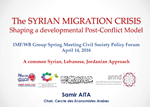The Syrian Migration crisis: Shaping a Developmental Post Conflict Model
Published on Fri, 2016-04-22 12:15
This paper discusses the newly issued World Bank report on the welfare of the Syrian refugees in Lebanon and Jordan, based on the analysis of UNHCR data. It points some significant aspects not addressed, especially the effects Syrian pre-crisis public policies. It highlights the gap between the lack of proper socioeconomic assessment of both refugees’ and hosting communities and the fact that resilience and integration policies are already been negotiated with the Lebanese and Jordanian governments. This is while there no such efforts dealing with Egypt, Iraq and mainly Turkey, who are receiving large numbers of refugees. In addition, the Civil Society organizations are channeling a large share of the humanitarian aid, while they have, as well as the Syrian refugees’ and hosting communities, no proper voice in the debate. The paper presents a framework of a post-conflict development model for recovery and reconstruction. It advocates a common cooperative development scheme for Syria, Lebanon and Jordan. Such a scheme is based on cross-border regional cooperation and on creating positive expectations for post-conflict development, which should start swiftly in the regions hosting the refugees. Infrastructures, public services, health and education are priorities. Incentives should be developed to create decent employments, to reduce inequalities, and to fix and encourage the return of refugees, in particular the highly skilled. The efforts of the international community should be coordinated towards enhancing the efficiency and accountability of the local and countries’ governance and institutions, circumventing the dynamics of war economy. The general sanctions on the Syrian population should be reviewed and lifted to enable economic development. The past years were remarkably characterized by the ongoing Syrian conflict that took its toll on hundreds of thousands of lives, and which its spillovers have triggered a massive humanitarian crisis and a migration one, crossing the Mediterranean towards Europe. It is estimated that half of the Syrian population has been displaced at end of 2015, then around 11 million, mostly internally, with nearly 4.4 million of Syrians registered as refugees abroad, while 1.5 million others abroad do not have such status. Lebanon and Jordan are the most affected countries by this massive migration of population, unprecedented since the Palestinian forced exile, where they constitute a large share of the hosting country population. Although, Turkey and some European countries received significant numbers of Syrian refugees. The response to this crisis and to the needs of the displaced Syrians and to the affected hosting communities has been in most cases confused, short-term, ad-hoc and insufficient. There is a need for a long-term approach to the crisis of Syrian refugees, taking into consideration that there is no rapid reversibility of this migration flow and that the core problem is that of the internally displaced. Even if the war in Syria stops abruptly, the return of the internally displaced and refugees shall be gradual, function of the speed of Syria’s recovery and development and the nature of the “peace agreement”. The effectiveness of the current programs of humanitarian aid, consisting of cash assistance, food vouchers, e-cards, is thus highly questionable in a medium-term perspective, even if they are currently alleviating the sufferings of the most vulnerable population. Their sustainability is also questionable, as the current commitments of donors are far from being fulfilled. This is while there are calls to put more focus in international aid on education, skills, and labor. A World Bank report (Verne et al., 2016), performed in partnership with UNHCR and based on its data, had tackled the issue of the welfare of Syrian refugees in Lebanon and Jordan. This report has created the occasion to propose WBG policy recommendations for the Syrian refugees in the medium-term (WB, 2016). The present policy paper discusses the results presented in the report, as well as the draft policy recommendations from a civil society perspective, shared between Syrians, Lebanese and Jordanians. Read here the publication “The Syrian Migration crisis: Shaping a Developmental Post Conflict Model”. |
SUSCRIBE TO OUR NEWSLETTER



